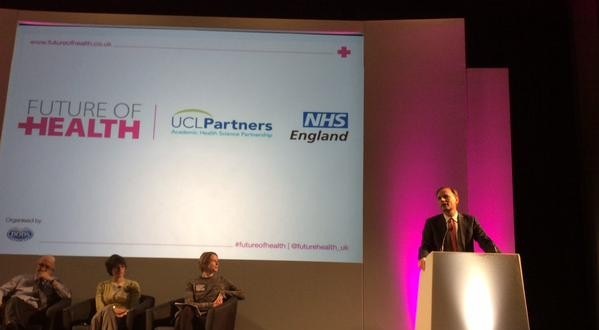
Future of Health, the NHS ideas about patients and carers
On the eve of the 2014 Future of Health Conference, NHS England’s Director for People with Long Term Conditions, Dr Martin McShane, explains why empowering patients is vital:
“I was speaking at a conference last week and was introduced to Shirley. She was speaking before me, providing the patient’s perspective. Shirley has Chronic Obstructive Pulmonary Disease and lives alone. She was talking about the impact using ‘Flo’, a simple text messaging based tele-health service has had on her life. I asked her what impact it had had. She told me that before starting to use Flo she was quite anxious and worried about what to do, when and why. Once she started using Flo it reduced her anxiety and helped her manage her condition.
“Are you still using it?” I asked. “No,” replied Shirley. The way she said it made me wonder what had gone wrong, why she had abandoned something which she had obviously found of benefit.
“Why did you give up?” I queried.
“I didn’t need it any more. Using it every day had taught me what to do, I had learnt what to do, when and why. It had taught me all I needed to know and I have control now,” replied Shirley.
Her simple, factual, personal response gave me an insight into the shift of control technology enabled care can bring about for individuals. In seeking to enhance the quality of life for people with long term conditions (one of the snappiest titles for any director in NHS England…) we need to make a paradigm shift in our thinking. As a recent article in the BMJ, ‘Flipping healthcare’, pointed out, providers of health and care need to ask not ‘what matters’ but ‘what matters to you’. We need to put the person, not the disease or condition, at the centre of everything we do.
What Trevor, a young person with diabetes, wants is set out in the article, and technology can help enable people to have more control of their own health in so many ways – but it requires a change in attitudes, beliefs and mind-set from the professions who will subliminally recognise it entails a shift in power to the patient and their carers – the professional need to move from being the ‘sage on the stage’ to ‘the guide on the side’. Shirley reminded me of something last week – the greatest asset the NHS has is the people who use it, which is why they are central to the Five Year Forward View. This is also why the focus of this year’s Future of Health Conference is entirely about empowered individuals and carers. Why every session starts with a people’s panel representative. Why innovation, technology and enablement is one of the four themes running through the conference. It is about acknowledging who is the most important person in deciding what matters.
The Future of Health Conference is being staged at Kensington Olympia, London, tomorrow (Friday November 21), and will be opened by NHS England’s Chief Executive Simon Stevens.
Other speakers will include Professor David Haslam, Chair of NICE, and Professor Steve Field, Chief Inspector of General Practice for the CQC, as well as Tim Kelsey, NHS England’s National Director for Patients and Information.To register go to: www.futureofhealth.co.uk


